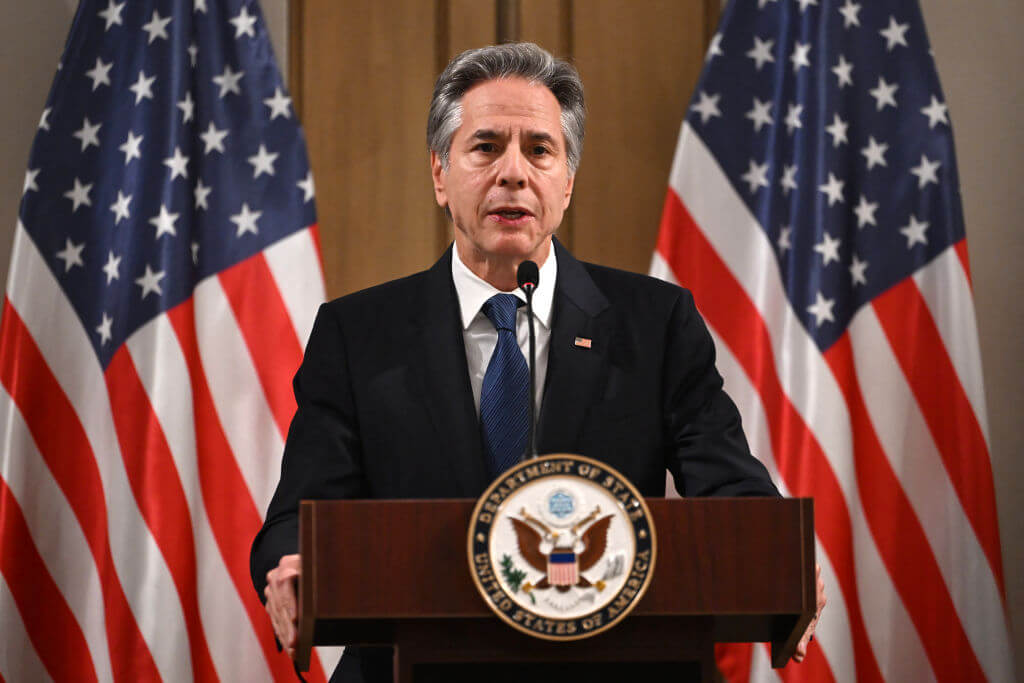In exit interview, Secretary of State Blinken reflects on U.S.-Israel tensions and the struggle for a ceasefire in Gaza
‘Hamas, when they saw Israel under pressure publicly, they pulled back,’ Blinken said

Secretary of State Antony Blinken on Dec. 14, 2024. Photo by ANDREW CABALLERO-REYNOLDS/AFP via Getty Images
Secretary of State Antony Blinken acknowledged in an interview posted Saturday that “public daylight” between Israel and the U.S. over the war in Gaza hardened Hamas’ positions in talks on a ceasefire-hostage deal. But the outgoing U.S. top diplomat insisted that the unresolved Middle East war won’t define his legacy.
“Whenever there has been public daylight between the U.S. and Israel and the perception that pressure was growing on Israel,” Blinken said in a wide-ranging podcast interview with The New York Times, “Hamas has pulled back from agreeing to a ceasefire and the release of hostages.”
Talks are ongoing in Doha, Qatar to finalize an agreement between Israel and Hamas before President-elect Donald Trump takes office on Jan. 20. Trump said that he supports the efforts and issued an ultimatum to Hamas, threatening that there will be “hell to pay” if all hostages are not released before he returns to the White House on Jan. 20.
Reuters reported on Sunday that Hamas approved a list of 34 hostages submitted by Israel in a prisoner exchange.
The Biden administration has been attempting a push to get a hostage and ceasefire deal sealed since Nov. 2023, when fighting paused for a week and 112 hostages were released. At least 50 of the 100 hostages held by Hamas in Gaza are believed to be alive, including three Americans – Keith Siegel, Edan Alexander and Sagui Dekel-Chen. The terrorist group used previous hostage negotiations to seek a full Israeli withdrawal from Gaza as a condition for a three-phased ceasefire deal, while hardliners in the coalition of Israeli Prime Minister Benjamin Netanyahu threatened to topple the government if he agreed to end the war.
President Joe Biden and Netanyahu publicly clashed over key issues, including the launch of a ground operation in Rafah. In October, amid increased criticism from progressive Democrats and leaders of the ceasefire movement, Biden warned that the U.S. would restrict weapons transfers to Israel if the flow of humanitarian aid into the Gaza Strip does not increase.
“Hamas, when they saw Israel under pressure publicly, they pulled back,” Blinken said. He added that the administration had since made an effort to air disagreements with Israel in private.
A hard truth from Secretary of State Anthony Blinken: “Whenever there has been public daylight between the US and Israel and the perception that pressure was growing on Israel, Hamas has pulled back from agreeing to a ceasefire and the release of the hostages.”
— Ritchie Torres (@RitchieTorres) January 6, 2025
Those who have… pic.twitter.com/TsvtdY9XBH
Blinken maintained that the Israeli government positions and military actions did not undermine the prospects of finalizing a deal, but acknowledged periods of slower progress. And he highlighted the “extraordinary amount of work” the Biden administration put “to build the foundation” for a post-war regional peace plan.
In the interview, Blinken expressed outrage that global criticism of Israel was one-sided. “Why there hasn’t been a unanimous chorus around the world for Hamas to put down its weapons, to give up the hostages, to surrender,” Blinken asked rhetorically, while saying that it does “not absolve Israel of its actions” in Gaza. “I do have to question how it is that we haven’t seen a greater sustained condemnation and pressure on Hamas to stop what it started and to end the suffering of people that it initiated.”
Blinken was Biden’s secretary of state for the full term. Sen. Marco Rubio of Florida — Blinken’s successor, pending Senate confirmation — was more vocal about his support for Israel’s actions in Gaza. Rubio likened the IDF ground operation in Rafah to the Allies’ pursuit of Adolf Hitler during the Holocaust.
















